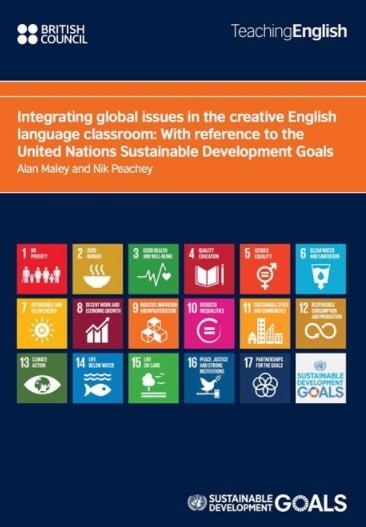For English teachers, it’s really important to carry on learning: to be a lifelong learner. As the world is changing, education needs to evolve too. The IATEFL (International Association of Teachers of English as a Foreign Language) Teachers Conference is a 5 day event connecting teachers from all over the world.
This year the IATEFL conference was in Brighton and in 5 days, staff from More Than English attended about 45+ lectures and workshops by leading academics and other teachers. Here are some of the key points and memorable moments we took away from the conference:
(1) Integrating global issues in the creative English classroom – IATEFL
In 2015 The United Nations announced a series of 17 Sustainable Development Goals that are designed to end poverty, fight inequality and tackle both climate change and injustice by 2030.
What’s the connection with English Language Teaching? That’s simple. Language learning is more interesting and more motivating if it is connected to the real world. Discussions, presentations and debates that tackle real issues motivate students to use their English more.
Here’s an example of More Than English students using their new speech making skills to change the world:
The British Council have published a book which gives teachers lots of ideas about how to improve their English lessons and help the United Nations reach the Sustainable Development Goals at the same time. You can download the book here.

(2) Motivation – IATEFL
It’s a teacher’s responsibility to make sure teenagers learn English. However, if teenagers are self-motivated, they are going to learn much, much faster.
One of our favourite IATEFL speakers this year was Sandra Lindon (www.sandralindon.com) a British teacher living in the Pisa area of Italy who specialises in teaching medical English. She takes the idea of the importance of motivation a step further, arguing that teachers need to put more responsibility on learners:
“Languages can’t be taught. They can only be learnt.”
Some of Sandra’s points:
- the importance of helping students get motivated by helping them visualise the future benefits of learning English
- learning a foreign language is a big task. To be successful, students need to make learning English part of their everyday life
- the importance of setting achievable goals, getting motivated and helping students to think about how they learn and choosing the best ways for them.
What’s the connection to summer school? Not just children, but many adults too, are learning English sometimes without considering why. For teenagers, summer school at More Than English is hugely motivating:
- Necessity: More Than English only accept individuals (no groups). With 16 nationalities on campus, teenagers have to communicate in English. There’s no choice!
- Excitement: it’s very exciting for a teenager to discuss their opinions and find things in common with other young people from all over Europe, Asia and Latin America.
- Use your English in new ways: at More Than English students learn to use their English to learn new skills from Film Making to Speech Making to Golf.
Read more about our Get Ahead study options.
(3) Practice, Practice, Practice – IATEFL
Well known text book writer Jim Scrivener made teachers very happy when he controversially said at IATEFL:
“Forget methodology. Learners just need more practice.”

Some of Jim’s most interesting points:
Ambience – how practice feels
- Make practice fun: do the most exciting stuff first
- Ninja practice: rapid practice
- Set ridiculously short time limits
- Change the rules half way through an activity to excite students
- Change the time limit half way through an activity to pressure and focus students
Repetition
3xp
3 x practice
- Do practice the normal way then check it
- Do the same practice a second time – but with added challenge (e.g. hide some words)
- Practise the same point again, but personalise it
Alternative ideas from More Than English teachers:
- For gap-fills:
- (1) all students show their answer on a mini-whiteboard
- (2) Say the answer
- (3) Write the answer
- (4) Repeat the same exercise the next day
This repetition means more practice and more learning.
Thank you Jim for the new ideas!
How we make sure students have high quality and high quantity practice of language on summer school
Our students come from 16+ different countries and go to very different schools. However, in the academic year, September to June, in most schools, teachers are under a lot of pressure to introduce and explain a lot of language especially grammar. The problem is that as a result students often do not get enough practice. In some cases, students know the language points passively, but they can’t produce the language. At More Than English we focus on practice:
- In grammar lessons we spend more time practising, less time explaining.
- Practice > learn > Practice = we start lessons and end lessons with practice
- In two weeks, with all the lessons, all the activities, excursions, mealtimes and breaktimes, students have the opportunity to speak for about 150 hours, and with a staff to student ratio of 1:4 there are a lot of staff to make sure everyone is speaking in English as much as possible. 150 hours is a lot of practice!
- Meaningful practice: everyday in Core English classes students do a task such as a presentation, discussion or interview or research. By using their English to communicate real meaning, the practice is more memorable
Attending the IATEFL conference is super exciting for teachers. Meeting so many teachers and sharing all those ideas creates so much energy. Thank you to @IATEFL for a fantastic conference. We’ll see you again next year at IATEFL Liverpool.



